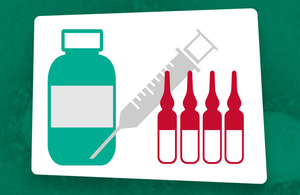Latest monitoring data confirms safety of COVID-19 vaccines
Data published from UK’s independent medicines regulator confirms approved vaccines meet strict regulatory standards for safety

This press release features data on adverse reactions up to 24 January 2021.
Our coronavirus (COVID-19) vaccine adverse reactions report is updated weekly with the latest data.
- Data published from UK’s independent medicines regulator confirms approved vaccines meet strict regulatory standards for safety
- Vast majority of reported side effects are mild and short lasting, reflecting a normal immune response to vaccines – including a sore arm and fatigue
- The benefits of the COVID-19 vaccines outweigh the risks
Routine safety monitoring and analysis of the approved COVID-19 vaccines by the UK’s medicines regulator, the Medicines and Healthcare products Regulatory Agency (MHRA), shows that the safety of these vaccines remains as high as expected from the clinical trial data that supported the approvals. The safety profile of the vaccines remains positive and the benefits continue to far outweigh any known side-effects.
Over 10 million doses of the Pfizer/BioNTech and the Oxford University/AstraZeneca vaccines have been given across the UK and the MHRA has gathered a large amount of safety data. Data published today shows 22,820 reports of suspected side effects, or an overall reporting rate of 3 in 1,000 doses of vaccine administered from 9 December 2020 to 24 January 2021. This reassuring data has shown that the vast majority of reported side effects are mild and all are in line with most types of vaccine, including the seasonal flu vaccine. These include sore arms and mild ‘flu-like’ symptoms, which reflect a normal immune response to vaccines and are short-lasting.
The MHRA has today published its safety surveillance strategy for monitoring the safety of all UK-approved COVID-19 vaccines. This has been informed by the Government’s independent advisory body, the Commission on Human Medicines, and expertise across the UK public health sector.
The MHRA has also published today the first of what will be regular COVID-19 vaccine safety reports. These provide details on the suspected side-effects to the vaccines reported through its safety monitoring system, the Yellow Card scheme. This data has been thoroughly analysed by the MHRA’s scientists and safety experts together with all other sources of evidence.
The MHRA is working to actively promote reporting on COVID-19 vaccines from patients and healthcare professionals to the Coronavirus Yellow Card scheme. Anyone who has received the vaccine and thinks they may have suffered a side-effect, even suspected, is encouraged to report it to the MHRA at: coronavirus-yellowcard.mhra.gov.uk.
Safety monitoring of all medicines and vaccines used by the wider UK population is a key role of the MHRA. The safety of COVID-19 vaccines is continually monitored throughout their use in healthcare practice to ensure they remain safe and effective. The regulator does this by identifying and comparing new and emerging data from multiple sources with what it already knows from large-scale clinical trials.
Dr June Raine, MHRA Chief Executive, said:
Vaccines are the most effective way to protect against COVID-19 and save lives and prevent serious complications from this terrible virus.
The data we have collected provides further reassurance that the COVID-19 vaccines are safe and continue to meet the rigorous regulatory standards required for all vaccines. We remain confident that the benefits of these vaccines outweigh any risks.
Our priority is to ensure the public have safe and effective vaccines and we will continue to analyse, monitor and review all the safety data for these vaccines.
I’d like to thank everyone who has reported a potential side effect to us - every report matters.
END
Notes to Editors
- A report covering adverse reactions to approved COVID-19 vaccines
- Report of the Commission on Human Medicines Expert Working Group on COVID-19 vaccine safety surveillance
- Anyone can use the Yellow Card scheme to report suspected side effects of medicines, and incidents involving medical devices, and defective or fake medical products.
- Reports can be made on the Yellow Card reporting site, via the mobile app from the Google Play Store or Apple App Store, via freephone (0800 731 6789, 9am to 5pm Monday to Friday) or by reporting an issue to their healthcare team who can file a report on their behalf. Patients are also advised to contact a healthcare professional if they are worried about their health.
- The Medicines and Healthcare products Regulatory Agency (‘the agency’) has three centres. The MHRA, the National Institute for Biological Standards and Control (NIBSC) and the Clinical Practice Research Datalink (CPRD). The agency is an executive agency of the Department of Health and Social Care.
- The Commission on Human Medicines (CHM) advises ministers and the MHRA on the safety, efficacy and quality of medicinal products. The CHM is an advisory non-departmental public body, sponsored by the Department of Health and Social Care.
- The MHRA has statutory responsibility for continuous safety monitoring (pharmacovigilance) following vaccine approval, and in ensuring the balance of benefits and risks remains favourable.
- Public Health England (PHE) has responsibility for surveillance of the immunisation programme including vaccine coverage, the impact on disease and seroprevalence at a population level, monitoring vaccine failures and monitoring attitudes to vaccination.
- The MHRA and PHE work independently from each other, but often collaborate on scientific methods and standards for safety surveillance.
Media enquiries
News centre
MHRA10 South Colonnade
London
E14 4PU
Email newscentre@mhra.gov.uk
Telephone (including out of hours): 020 3080 7651
Updates to this page
-
Added links to the report covering adverse reactions to approved COVID-19 vaccines as well as the Report of the Commission on Human Medicines Expert Working Group on COVID-19 vaccine safety surveillance
-
First published.